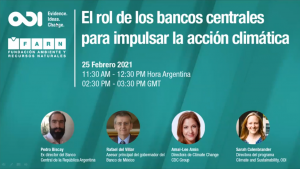“The role of central banks in driving climate action.
How Latin America can integrate the challenges from climate change into its monetary and financial policies?”
25 February 2021
“How can civil society organizations drive climate action in Central Banks?”
6 April 2021
These training modules are affiliated with the Climate Transparency Report, the world’s most comprehensive annual review of G20 countries’ climate action and their transition to a net-zero emissions economy.
The first event, “The role of central banks in driving climate action”, which took place on 25 February 2021, was dedicated to answering the question of how can Latin America integrate the challenges from climate change into its monetary and financial policies. To explore why and how central banks across Latin America can contribute to a climate-safe future, ODI and FARN brought together leading experts from central banks, development agencies, foundations, research institutes and NGOs to examine best practices in the region and beyond.
Sarah Colenbrander (ODI) and Enrique Maurtua Konstantinidis (FARN) moderated the session while expert presentations were delivered by Rafael del Villar (Bank of Mexico), Amal-Lee Amin (CDC Group) and Pedro Biscay (former Director of the Central Bank of Argentina). The panelists examined whether climate change falls within the mandate of central banks, how central banks can monitor and assess climate-related risks, and how central banks can regulate the financial sector to shift investment from grey to green sectors. Presentations were followed by a panel discussion and Q&As session.

The event gathered 72 participants from civil society in Argentina as well as representatives of the private and public sector, the government and academia.
In the invitation-only workshop “How can civil society organizations drive climate action in Central Banks?” on 6 April 2021, 29 participants from civil society organizations the private and public sector, as well as academia sought to explore how civil society organizations in Argentina can work to integrate climate change challenges into the monetary and financial policies of the Central Bank in order to reorient investments towards a cleaner, low-carbon economic recovery process. Various specialists in the field shared experiences, lessons learned and possible approaches on how civil society actors can get involved in Central Bank decision making to promote climate action.
Sarah Colenbrander (ODI) moderated the first part of the workshop, which started with presentations from Prashant Vaze (Climate Bonds Initiative) and Santiago Lorenzo (CAN International) and followed by a Q&A session. Presenters shared experiences, lessons learned and recommendations from working in other countries from the Global South such as India and Brazil, and the Network of Central Banks and Supervisors for Greening the Financial System (NGFS).
The second part of the event focused on the functioning and the role of the Central Bank of Argentina (BCRA) and identifying opportunities of engagement for CSOs. It was facilitated by Maria Marta Di Paola (FARN) and featured presentations by former director of the BCRA Pedro Biscay and Andrea Barreyro (CEPPAS). This segment was then followed by a discussion and Q&As session. In total, 29 participants attended the second workshop, representing civil society organisations, private and public sector as well as academia.
Please check below for detailed agendas and the recording.







